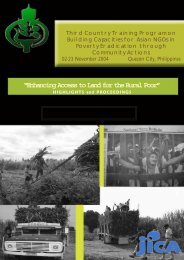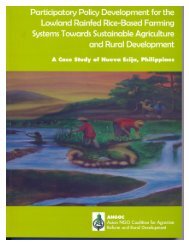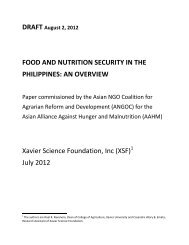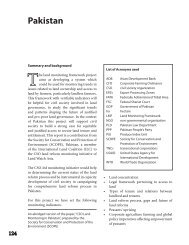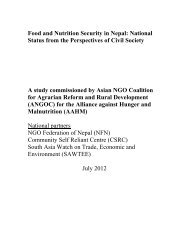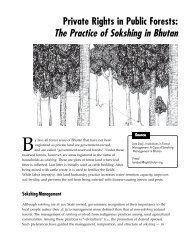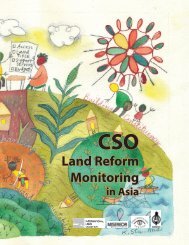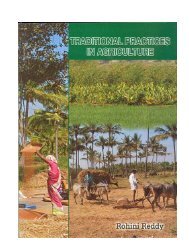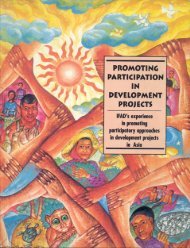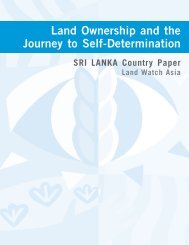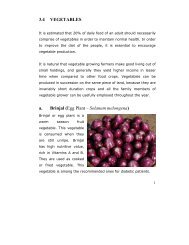Securing the Right to Land FULL - ANGOC
Securing the Right to Land FULL - ANGOC
Securing the Right to Land FULL - ANGOC
Create successful ePaper yourself
Turn your PDF publications into a flip-book with our unique Google optimized e-Paper software.
hindered by a vicious cycle that is difficult but not impossible <strong>to</strong><br />
break. The following are <strong>the</strong> conditions or prerequisites for <strong>the</strong><br />
successful implementation of land reform in <strong>the</strong> country:<br />
1. Democratic space.<br />
People can claim <strong>the</strong>ir rights only in a democratic system.<br />
Democracy based on social justice provides enormous space<br />
<strong>to</strong> <strong>the</strong> people and civil society <strong>to</strong> pursue <strong>the</strong>ir agenda. Political<br />
will is ano<strong>the</strong>r important aspect of this precondition.<br />
2. Critical mass and political clout.<br />
People need <strong>to</strong> be organized and increase <strong>the</strong>ir influence<br />
among political ac<strong>to</strong>rs and state mechanisms in order <strong>to</strong><br />
get a proper hearing for <strong>the</strong> problems of victimized people.<br />
A critical and supportive civil society, pro-people state<br />
mechanisms, supportive donors, and o<strong>the</strong>r international<br />
ac<strong>to</strong>rs are some of o<strong>the</strong>r important conditions for effective<br />
land reform in Nepal.<br />
3. Access <strong>to</strong> land-related information.<br />
Both <strong>the</strong> land rights victims and CSOs should have in-depth<br />
knowledge of <strong>the</strong> causes and symp<strong>to</strong>ms of poverty, injustice,<br />
and violation of human rights. Based on <strong>the</strong>se facts, civil society<br />
and ordinary people could make a convincing case <strong>to</strong><br />
<strong>the</strong> political ac<strong>to</strong>rs such that <strong>the</strong>y are forced <strong>to</strong> take appropriate<br />
actions <strong>to</strong> respond <strong>to</strong> <strong>the</strong> issues. Civil society and human<br />
rights organizations can also publicize information widely<br />
enough, such as exposés of corruption and injustice, <strong>to</strong> draw<br />
<strong>the</strong> attention of concerned duty bearers. Ano<strong>the</strong>r important<br />
fac<strong>to</strong>r for <strong>the</strong> success of a land rights movement is increasing<br />
and productivity. A concentrated effort should be made in<br />
this regard.<br />
4. Building multi-stakeholder cooperation and partnerships.<br />
<strong>Land</strong> reform and ensuring social justice for <strong>the</strong> poor is no<br />
easy task. It is linked with <strong>the</strong> political economy, with all its<br />
complexities. Thus, <strong>the</strong>re should be a collective effort by as<br />
many stakeholders as possible, such as <strong>the</strong> State, <strong>the</strong> private<br />
sec<strong>to</strong>r, civil society, and farmers. In particular, <strong>to</strong> decentralize<br />
land management at <strong>the</strong> local level, enhancing<br />
farmers’ capacity <strong>to</strong> produce surplus, and simplifying land<br />
governance, and legal and institutional mechanisms are<br />
key areas of intervention.<br />
5. Shared commitment <strong>to</strong> land reform.<br />
The shared appreciation for <strong>the</strong> urgency of land reform<br />
among <strong>the</strong> political ac<strong>to</strong>rs, and <strong>the</strong> provisions in <strong>the</strong> Interim<br />
ASSERTING FREEDOM FROM CENTRAL CONTROL<br />
125<br />
Constitution of 2007 promoting scientific land reform<br />
should support advocacy efforts.<br />
Opportunities<br />
Nepal is going through political transition. Despite ups and<br />
downs, people in general are confident about making changes.<br />
The landless and people without tenancy rights are aware and<br />
are getting organized. The present government was formed<br />
through people’s popular power. Thus, politicians are anxious <strong>to</strong><br />
bring about changes not just <strong>to</strong> improve conditions in <strong>the</strong> country<br />
but also <strong>to</strong> keep <strong>the</strong>mselves in power.<br />
The current legislation (e.g., <strong>the</strong> Interim Constitution of 2007;<br />
<strong>the</strong> Three-Year Interim Plan) already provides a road map <strong>to</strong>ward<br />
<strong>the</strong> goal of land reform. Civil society and <strong>the</strong> development sec<strong>to</strong>r<br />
have come <strong>to</strong> understand <strong>the</strong> importance of land reform as<br />
an effective means <strong>to</strong> address poverty and <strong>to</strong> enable landless<br />
people <strong>to</strong> claim <strong>the</strong>ir rights. Institutions such as <strong>the</strong> NLRF and<br />
NLRCG have emerged, and NGOs such as CSRC are supporting<br />
<strong>the</strong>m in every way possible. Their skills in dealing with land issues<br />
have improved significantly.<br />
Risks and Challenges<br />
As much as land reform is important, it is undeniably challeng-<br />
ing. His<strong>to</strong>ry has shown that land is <strong>the</strong> source of socio-economic<br />
and political power. The small elite class will not readily<br />
relinquish such power, and is likely <strong>to</strong> oppose or create obstacles<br />
<strong>to</strong> <strong>the</strong> implementation of land reform.<br />
The leaders of political parties come from <strong>the</strong> same elite class.<br />
Hence, it is likely that <strong>the</strong>y would pay lip service <strong>to</strong> <strong>the</strong> scientific<br />
land reform prescribed in <strong>the</strong> Interim Constitution of 2007,<br />
but oppose it in practice.<br />
Globalization poses ano<strong>the</strong>r challenge. A market-based economy,<br />
which globalization espouses, regards land as a commodity whose<br />
value needs <strong>to</strong> be maximized, ra<strong>the</strong>r than as an entitlement of<br />
<strong>the</strong> landless. Donors, such as <strong>the</strong> World Bank and Asian Development<br />
Bank, among o<strong>the</strong>rs, have been pursuing a market-based<br />
approach <strong>to</strong> land reform, which might not work in <strong>the</strong> interests of<br />
poor tillers and peasants. This needs <strong>to</strong> be analyzed and studied<br />
critically and carefully.<br />
Strategies<br />
Since Nepal is undergoing socio-economic restructuring of <strong>the</strong><br />
State, <strong>the</strong> following actions should be prioritized. A number of<br />
ASIAN NGO COALITION FOR AGRARIAN REFORM AND RURAL DEVELOPMENT



